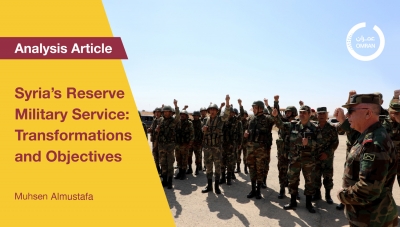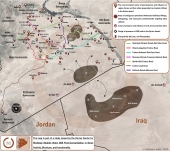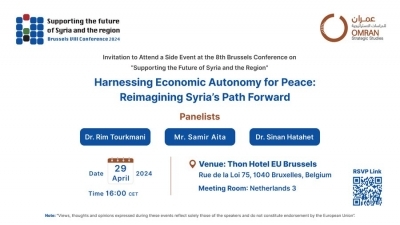Reserve service has been one of the most significant human resource components of the Syrian Regime Army, yet it has also posed one of the greatest challenges and obstacles for Syrians, especially after 2011. This is due to its extended duration([1]), with recruits unable to ascertain the length of their service or their discharge date.
The Turkish-Russian ceasefire agreement of March 2020 and the cessation of major military operations enabled the army to implement changes in reserve service, along with other reforms within the military and security institutions.
From mid-2023 to mid-2024, the leadership of the Army issued several administrative orders to end the retention of certain categories of reserve service personnel([2]). This occurred before the official announcement of a plan for a "professional army", as stated by the Director of the General Administration of the "Army and Armed Forces"([3]).
This article aims to clarify the current plan for reserve service and the objectives the regime seeks to achieve. Additionally, it will highlight the legal aspects related to reserve service and trace the changes made over the past several years.
Reserve Service Plan:Confirmed to Be 2 Years after All
It has become evident over the years that the regime has implemented new measures related to the army, especially after the appointment of a new Minister of Defense in April 2022([4]). The years of military conflict since 2011 have demonstrated to the regime that an army based on conscripts is neither effective nor reliable. The regime’s lack of trust into its own army stems not only from the military's lack of professionalism but also social and sectarian reasons. Consequently, the regime has found it necessary to shift towards building a “professional army” composed of enlisted (volunteer) personnel, starting with a gradual reduction in the duration of reserve service as the first step toward redefining compulsory military service. However, this transition will take several more years to fully realize, ultimately helping to sustain the solid core upon which the regime has relied in its war against people.
The plan to build a “professional army” began with the army leadership introducing consecutive volunteer contracts for five or ten years. These contracts clearly outlined the substantial benefits provided to new enlistees, including higher salaries and additional bonuses. The new enlistees are exempt from compulsory military service if they complete five years of service and could leave the army upon completing the contract, subject to approval from the General Command. Notably, these benefits were not extended to previous enlistees, including in terms of salaries or entitlements([5]).
Additional administrative orders related to reserve service continued to be issued until the reserve service plan was officially announced in June 2024. The plan is based on three main phases, culminating in a defined reserve service duration of 24 months([6]). The plan is structured as follows:
| Discharge Date | Duration of Reserve Service | Note |
| Phase One | ||
| 01/07/2024 | 6 years | Discharged |
| 31/08/2024 | 5.5 years | Discharged on the specified date |
| 31/10/2024 | 5 years | Discharged on the specified date |
| 31/12/2024 | 4.5 years | Discharged on the specified date |
| Number of discharges by end of Phase One | 46,044 military personnel | |
| Phase Two | ||
| 28/02/2025 | 4 years | Discharged after completing 4 years of service by 31/01/2025 |
| 30/04/2025 | 3.5 years | Discharged after completing 3.5 years of service by 28/02/2025 |
| 30/06/2025 | 3 years | Discharged after completing 3 years of service by 31/03/2025 |
| 31/08/2025 | 2.5 years | Discharged after completing 2.5 years of service by 30/04/2025 |
| 31/10/2025 | 2 years | Discharged after completing 2 years of service by 31/05/2025 |
| Total number of military personnel to be discharged by the end of Phase Two | 105,869 | |
| Total number of military personnel to be discharged during Phases One and Two | 151,913 | |
| Phase Three | ||
| 01/01/2026 | 2 years | Discharged after completing 2 years of service |
Table (1): Reserve Service Plan
According to the official announcement, the plan may undergo modifications in the implementation of certain aspects based on the study of reserve service issues, including age criteria and years of service. The time periods for each of the three phases may be adjusted, either increased or decreased, based on the enlistment rates for compulsory military service and the number of contracted enlisted military personnel.
The large number of military personnel, approximately 152,000,expected to be discharged from reserve service by the end of 2025([7]) indicates significant human resources available to the army. This figure does not include those already enlisted or conscripted for compulsory military service at the time the plan was issued, and contradicts previous estimates and reports that indicated a significant personnel shortage in the army([8]).
The plan also includes a clause for the discharge of enlisted military personnel who complete five years of their new recruitment contract (as fighters) and choose not to continue. These individuals will not be retained or called up for reserve service until five years have passed since their discharge. They are also exempt from compulsory military service. However, they may be called up for reserve service for one year only, which can be served continuously or intermittently. Those with ten-year contracts are fully exempt from reserve service upon completion.
Legal Amendments: Serving the Regime's Interests
After the beginning of the Syrian revolution in March 2011, and due to the circumstances imposed by the conflict, the regime made numerous amendments to the Conscription Law (Legislative Decree No. 30 of 2007) to address gaps revealed by the conflict, despite the law having been recently enacted at the time([9]). Among the revised provisions was Article 26, which pertains to exemptions from reserve service. The first change came with Legislative Decree No. 31 of 2020, which added paragraph (e) to Article 26. This amendment allowed for the exemption of individuals residing outside Syria for at least one year upon payment of a cash allowance of USD 5,000."([10]) This amendment aimed to provide additional foreign currency to the Ministry of Defense's treasury.
At the end of 2022, Law No. 29 of 2022([11]) was issued, amending paragraphs (a) and (c) of Article 26. The amendment made paragraph (a) more specific, categorizing disabilities into three types: partial disability not fit for service, near-total disability, and total disability. Paragraph (c) detailed exemptions for only sons and those considered as such due to siblings affected by seven specified disabilities or ailments([12]). This amendment also coincided with the abolition of Decree No. 174 of 2006, which included the “Physical Fitness System for Conscription”([13]). This system had been used to determine whether a conscript could be fully exempted from service or assigned to field or stationary roles based on permanent health conditions.
The regime did not stop at these amendments. On 1 December 2023, it issued Legislative Decree No. 37 of 2023, adding a new paragraph (f) to Article 26([14]). This provision allowed conscripts for reserve service (enrolled or not) who had reached the age of 40 to pay a cash allowance of USD 4,800 or its equivalent in Syrian pounds, with a reduction of USD 200 or its equivalent for each month of service performed by the conscript. This amendment aimed to generate additional funds for the Ministry of Defense’s treasury. Later, in August 2024, the regime issued Legislative Decree No. 20 of 2024, which lowered the eligible age in paragraph (f) from 40 to 38 years([15]).
Additionally, Legislative Decree No. 20 of 2024 introduced two new paragraphs to Article 26. Paragraph (g) stipulated that conscripts could be exempt from reserve service by paying a cash allowance of USD 3,000 if they could prove they have partial disability not fit for service or near-total disability as listed in paragraph (a). This amendment aimed to offer a lower cash allowance for those with less than total disabilities, in line with the regime’s broader policies on disability, as outlined in Legislative Decree No. 19 of 2024([16]). (h) provided an exemption for military personnel who completed ten years of service under the new enlistment contracts mentioned above.
What Lies Behind the Reserve Service Plan?
The reserve service plan aims to alleviate social pressures in regime-controlled areas, especially following significant waves of men leaving the country to seek asylum. seeking to avoid reserve service is one of the factors, along with security or economic or social reasons. Notably, the regime has suspended reserve service for conscripted officers holding university degrees requiring at least five years of study, as well as those holding higher degrees such as a master’s or PhD([17]), regarding to brain drain as many professionals left Syria in order to avoid military service.
This plan is also closely related to the rate of personnel mobilization within the regime forces([18]).New conscripts are being recruited, and discharged personnel are being replaced by enlistees who were attracted through previously announced enlistment contracts. Thus, the plan remains flexible and may be adjusted at various stages, given that the transformation to a "professional army" is still in its early stages and has not yet fully matured.
Another goal of the plan is to make the benefits of enlistment contracts equal to or even better than those offered by contracts in pro-regime militias, marking a significant shift from previous practices. By offering these contracts, the regime aims to integrate militia members into the official military institution as individuals, rather than as distinct groups. This is especially evident in the raised age limit to 32 years, which suggests an effort to weaken militias by drawing their members into the official forces, without necessarily dismantling the militias entirely at least for now.
In some respects, the regime's plan aims to generate additional funds for the Ministry of Defense's treasury and to leverage reserve service as a tool against society to extort it to generate funds and to keep control over the population. The option to pay a cash allowance in lieu of reserve service was not available until 2020, initially only for those outside the country. By the end of 2023, this option was extended to those within the country who meet the age requirement.
The reserve service issue is one of many critical challenges arising from the conflict since 2011, significantly both the military and social spheres across a large segment of Syrians. The regime approaches this issue with caution and deliberation. While reserve service was an important source of human resources for the regime until 2020, it has since evolved into a revenue-gathering tool, with payments collected from conscripts who wish to avoid service and can afford the cash allowance, both inside and outside the country. The regime’s amendments also portray it as a reformist entity, such as showcasing reform efforts in negotiations with external actors, while this approach focus on its own interests, and without regard for the direct or indirect effects of its policies.
Appendix:
Article 26 of the Conscription Law Issued by Legislative Decree No. 30 of 2007 and All Its Amendments.
Original Article of 26([19]):
The Draftee may be exempted from Reserve Service in one of the following cases:
- Permanent lack of physical fitness for Military Service.
- The remaining children of two parents or one parent, whether both or one are living or dead, both or one of whom have had two children die or become martyred as a result of carrying out a work-related duty in the state or as a result of military operations.
- The only son of two parents or a mother, living or dead, who is effectively the only healthy son to a sibling or siblings who have been afflicted with disabilities or ailments which prevent them from caring for themselves.
- A father who has had one or more son die or become martyred as a result of war operations because of carrying out a work-related duty in the state or as a result of military operations recognized in the regulations.
Amended Article of 26([20]):
The Draftee may be exempted from Reserve Service in one of the following cases:
a. Those permanently unable to perform reserve service, as determined by a medical examination, falling into one of the following categories: (partial disability not fit for service; near-total disability; total disability). (Amended by Law No. 29 of 2022).
b. The remaining children of two parents or one parent, whether both or one are living or dead, both or one of whom have had two children die or become martyred as a result of carrying out a work-related duty in the state or as a result of military operations.
c. The only son of two parents or a father or a mother, living or dead, who is effectively the only healthy brother to a sibling or siblings who have been afflicted by one of the seven specified disabilities or ailments. (Amended by Law No. 29 of 2022).
- First:
- Complete kidney failure.
- Severe intellectual disability resulting in profound cognitive impairment.
- Severe schizophrenia and severe postpartum depression.
- Complete paralysis of one side of the body or all four limbs.
- Total blindness with no vision beyond light perception in either eye.
- Amputation of both lower limbs at the level of the legs or thighs.
- Amputation of both upper limbs at or above the wrist joint level.
- Second: Those in similar conditions may be recommended by the permanent medical committees and approved by the military medical council.
d. A father who has had one or more son die or become martyred as a result of war operations because of carrying out a work-related duty in the state or as a result of military operations recognized in the regulations
e. Those residing outside the territory of the Syrian Arab Republic for at least one year upon payment of a cash allowance of five thousand US dollars. (Added by Legislative Decree No. 31 of 2020).
f. Those who pay the cash allowance (enrolled or not) who have reached the age of 38 must pay 4,800 US dollars or its equivalent in Syrian pounds based on the exchange rate set by the Central Bank of Syria on the payment date. A reduction of 200 US dollars, or its equivalent in Syrian pounds based on the exchange rate set by the Central Bank of Syria on the payment date, is applied for each month of service performed by the enrolled conscript, with partial months rounded up. (Added by Legislative Decree No. 37 of 2023. The age limit was initially 40 but was amended to 38 by Legislative Decree No. 20 of 2024).
g. Those who pay the cash allowance (enrolled or not) of three thousand US dollars, or its equivalent in Syrian pounds as per the exchange rate set by the Central Bank of Syria on the payment date, if the medical examination confirms they fall into one of the categories (lower disability - partial disability capable of performing service). (Added by Legislative Decree No. 20 of 2024).
h. Military personnel who have completed ten years of service under the new enlistment contract (as fighters). (Added by Legislative Decree No. 20 of 2024).
([1]) After completing compulsory military service, men remain eligible for reserve call-up until age 42. Since 2011, conscripts have typically been retained as reservists beyond their initial service. The call-up for reserve service has also expanded to address increased manpower needs and issues of draft evasion and defection.
([2]) “What’s New in the Administrative Order of the Syrian Regime Regarding Military Service” Enab Baladi, Published on: 11/06/2024, Link: https://bit.ly/4d8kr79.
([3]) “Special Interview on Legislative Decree No. 37 of 2023” Syrian News “Al-Ikhbariya| Channel, Published on: 01/12/2023, Link: https://bit.ly/3Sytc2k.
([4]) “General Ali Mahmoud Abbas” Ministry of Defense, Published on: 30/04/2022, Link: https://bit.ly/3WsN4oF.
([5]) “Syrian Defense Militarizes Society with Tempting Enlistment Contracts”, Enab Baladi, Published on: 28/11/2023, Link: https://bit.ly/4ccvnQb
([6]) “Our Goal is to Develop an Advanced Army Based on Enlistees”, Ministry of Information, Published on: 27/06/2024, Link: https://bit.ly/3SzIq6W
([7]) Leaked document of the plan showing the numbers of military personnel in reserve service to be discharged at the end of each phase.
([8]) “The Syrian Regime’s Army is Drained: Figures Confirm the Loss of Human Resources”, Al-Araby Al-Jadeed, Published on: 31/07/2024, Link: https://bit.ly/46Fpzxq
([9]) “Legislative Decree No. 30 of 2007, Containing the Conscription Law” ,The Parliament, Published on: 03/05/2007, Link: https://bit.ly/3EyjJSk
([10]) “Legislative Decree No. 31 of 2020” Syrian e-Government Portal, Published on: 08/11/2020, Link: https://bit.ly/3YBmP1M
([11]) “Law No. 29 of 2022”, Official Gazette, Part One, Issue No. 2, 2023, Page No.: 16, Syria Report, Link: https://bit.ly/3AhLb6E
([12]) Previous reference or see the appendix, updated Article 26, Paragraph /C/.
([13]) “Decree No. 334 of 2022”, Official Gazette, Part One, Issue No. 2, 2023, Page No.: 17, Syria Report, Link: https://bit.ly/3AhLb6E.
([14]) “Legislative Decree No. 37 of 2023”, SANA, Published on: 01/12/2023, Link: https://bit.ly/4dwhyxO.
([15]) “Legislative Decree No. 20 of 2024”, SANA, Published on: 01/08/2024, Link: https://bit.ly/3Yr6Wek.
([16]) “Legislative Decree No. 19 of 2024”, SANA, Published on: 21/07/2024, Link: https://bit.ly/3LULHdi.
([17]) “Special Interview on the Administrative Order Ending Summons and Retention”, Syrian News “Al-Ikhbariya” Channel, Published on: 17/08/2023, Link: https://bit.ly/46yHWUp.
([18]) The regime has set a minimum percentage for human resources in the army that must not fall below a certain level.
([19]) “Legislative Decree No. 30 of 2007, The Conscription Law”, ibid.







